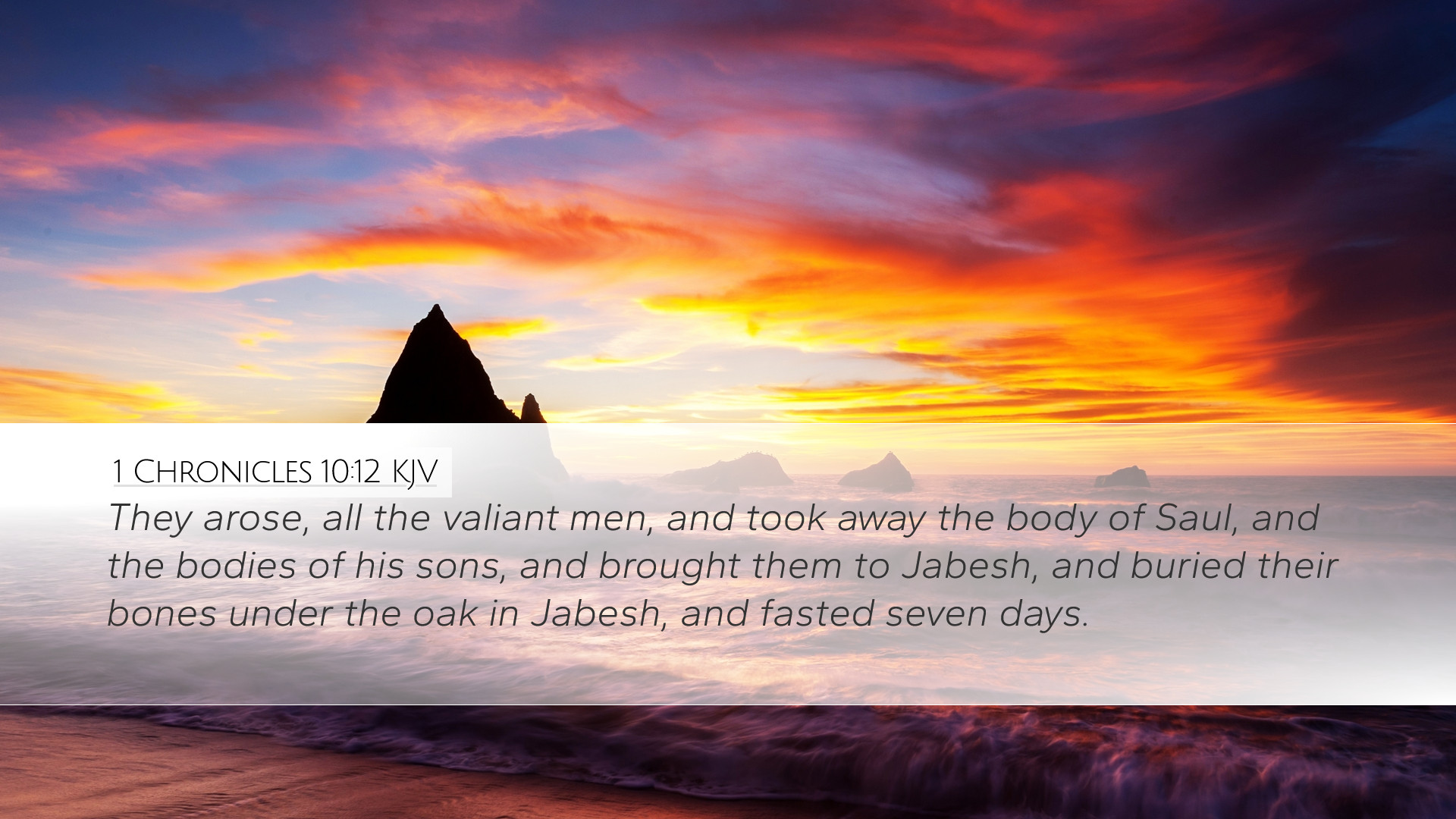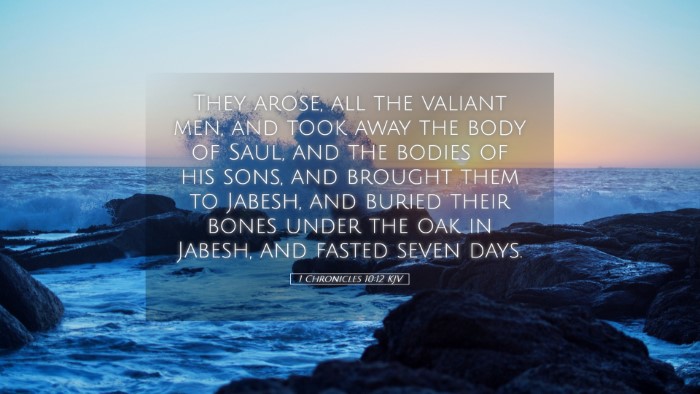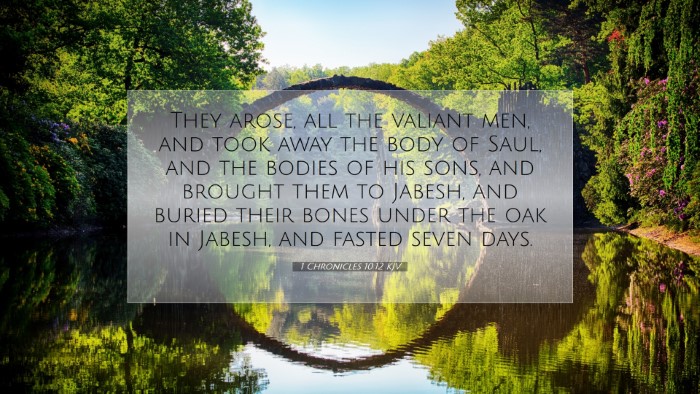Commentary on 1 Chronicles 10:12
Verse Reference: 1 Chronicles 10:12 - "They arose, all the valiant men, and took away the body of Saul and the bodies of his sons, and brought them to Jabesh, and buried their bones under the oak in Jabesh, and fasted seven days."
Introduction
This verse captures a poignant moment in Israel's history, reflecting the aftermath of King Saul's demise. It underscores themes of honor, respect for the dead, and the enduring loyalty of the people to their leaders even after defeat. The bodies of Saul and his sons, considered symbols of Israel's national identity and the preceding monarchy, are treated with dignity by brave warriors from Jabesh-Gilead. This commentary synthesizes insights from renowned public domain commentaries to deepen understanding of this significant biblical passage.
Context of the Passage
The historical context of 1 Chronicles is critical for understanding the theological implications of this verse. The narrative follows the death of Saul during a battle against the Philistines, as detailed in 1 Samuel 31. Saul’s tragic end, marked by despair and a tragic turn in his life, leads to his body being desecrated by the Philistines, who hung it on the wall of Beth-shan. It is the brave men of Jabesh-Gilead who, remembering Saul's earlier act of delivering their city (1 Samuel 11), risk their lives to recover and honor the remains of the fallen king and his sons.
Insights from Matthew Henry
Honor and Loyalty: Matthew Henry emphasizes the nobility of the men of Jabesh-Gilead, who demonstrate remarkable loyalty to Saul even after his failures as a king. Their actions serve as a testament to the importance of honoring one's leaders despite their flaws.
Courage and Sacrifice: Henry notes that their willingness to risk their lives shows true valor. The valiant men understood the cultural significance of providing a proper burial, which in ancient Israel was considered a sacred duty.
Spiritual Reflection: Henry draws a spiritual parallel, suggesting that just as these men honored Saul despite his shortcomings, Christians are called to recognize that leaders are human and fallible. Our honor should not diminish based on human failures but should recognize their appointed role.
Insights from Albert Barnes
Historical Significance: Albert Barnes places emphasis on the historical implication of the act of burying Saul and his sons. He notes that this moment marks the transition from the era of the judges and Saul's reign to the future establishment of David as king.
Respect for the Dead: Barnes highlights the significance of burial practices in ancient Israel. The swift and respectful handling of the bodies is indicative of the cultural values held by the Israelites towards their rulers, and it reflects the belief in life after death.
The Role of Memory: Barnes also discusses how the act of fasting for seven days signifies profound mourning, indicating that memory and respect were integral to the communal lifestyle of the Israelites. The practices around dying and mourning serve as a society's way to process loss.
Insights from Adam Clarke
The Mourning Period: Adam Clarke focuses on the seven-day fast following the burial. He argues that fasting serves not only as mourning but also as a means of seeking divine comfort and understanding in periods of grief.
Symbolism of Burial: Clarke provides a detailed analysis of the burial rites during this period. He discusses how the burial of leaders was significant in conveying their legacy and how this act in Jabesh-Gilead served as an act of defiance against the disgrace that had befallen Saul's name.
Lessons in Leadership: Clarke concludes that this passage offers a didactic lesson for contemporary leaders. It teaches that true leadership involves accountability, a connection with the community, and that honor, even in defeat, is essential for legacy.
Theological Reflections
The act of burying Saul and his sons demonstrates key theological reflections on leadership, honor, and community. The commentary from Henry, Barnes, and Clarke collectively teaches that leaders, no matter how flawed, deserve respect as they are appointed by God for specific purposes. In the context of Christian theology, this reflects the disposition with which believers are called to engage with their leaders, emphasizing grace and honor intertwined with accountability.
This passage also reflects on communal solidarity in grief and loss, revealing that collective memory and respect shape community identity. The willingness to stand united, honor the past, and learn from leaders, even those who have failed, is essential for spiritual growth and maturity within the church community.
Conclusion
1 Chronicles 10:12 serves as a melancholic yet profound reminder of the complexities of human leadership and the characteristics of true honor. This commentary, drawn from the insights of esteemed scholars such as Matthew Henry, Albert Barnes, and Adam Clarke, invites deeper reflection on the nature of respect, fidelity, and legacy. For pastors, students, and theologians, this verse encourages a holistic understanding of leadership, urging an attitude of grace and respect irrespective of human imperfections.


